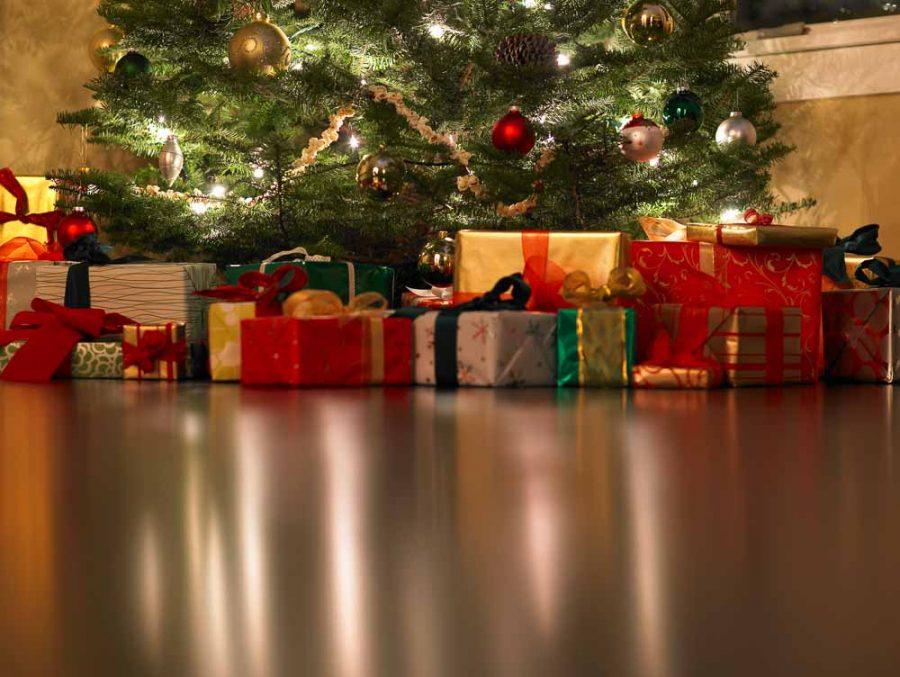Double the holiday fun: Celebrating both Hanukkah and Christmas
Photo Courtesy of Getty Images
Gift giving is a popular holiday tradition for friends and family. Several students say that their favorite Christmas memories include opening up presents on Christmas Day.
Dec 5, 2016
For as long as I can remember, December contained the two most important holidays for my family: Christmas and Hanukkah. My mother is Jewish and my father does not have a religion, but grew up celebrating Christmas, so my family celebrates both holidays. For us, the holidays are less about religion and more about bringing the family together for an almost nonstop month of celebrations.
When it comes to celebrating two major holidays with two separate families, it can be a bit difficult depending on the year, but there are some positives.
The dates of Hanukkah change year to year, whereas Christmas Eve and Christmas Day are always on the same days. Hanukkah lasts for eight days and begins on the 25th of Kislev each year, which is based on the Hebrew calendar. This usually means the festival of lights can start any time from the end of November to the end of December.
However, this year is the year that my mom dreads most: when Hanukkah overlaps with Christmas.
Hanukkah begins at sundown on Dec. 24 and lasts until sundown on Jan. 1, meaning it overlaps not only Christmas Eve and Christmas, but also New Years Eve.
Get The Daily Illini in your inbox!
At the end of the day, Hanukkah is always great, and we love to celebrate as a family, but my mother prefers when those eight days get dedicated to her holiday rather than competing with anything else.
Over the course of both holidays, we generally end up spending the same amount of time on each one, so I don’t consider one more important than the other. While Christmas is an all day event, racking up about 12 hours of togetherness for my family, Hanukkah is more of a nightly thing. Sometimes my sisters and I will have finals during Hanukkah or work to go to or other events to attend, but no matter what, we always set apart family time each night to light the menorah, eat dinner and open presents together. This amounts to about an hour or two each night.
One of my favorite aspects of Hanukkah is that it brings about a consistency that Christmas doesn’t. For us, Christmas is a lot of catching up with relatives, pretending to like gifts and waiting around for everyone to get to my grandparents’ house so we can eat dinner.
For Hanukkah, it’s just my immediate family, and we know to come home every day at sundown to “do Hanukkah” by lighting the candles on the menorah and opening small gifts (usually something along the lines of candy or socks). We do the same thing every night for over a week — and that kind of consistency doesn’t come along at any other point during the year.
We even put the Hanukkah gifts under our Christmas tree, which my dad always jokingly refers to as the “Hanukkah Bush” because there are more Hanukkah ornaments on it than there are angels. Yes, our extended family still gives us angel ornaments — they forget that this makes absolutely zero sense for our situation.
The worst part about celebrating two holidays is the ignorance people have about it. I grew up in a very Catholic suburb, so Christmas meant one thing: church. Many people I knew couldn’t seem to wrap their heads around the fact that my family celebrated Christmas, which is actually a federal holiday, solely because it was a time of togetherness for our family. Even my mom, who didn’t grow up celebrating it, loves it now.
Even though my mom hates when Christmas overlaps with Hanukkah, I don’t mind because it gets to show my dad’s side of the family how we celebrate the holiday. It’s good to learn about other people’s traditions. Just because I celebrate multiple holidays doesn’t mean I am necessarily Jewish or Christian; nowadays, it might just be a cultural way of bringing the family together.
Kelsie is a senior in Media.






